|
|
|
Sort Order |
|
|
|
Items / Page
|
|
|
|
|
|
|
| Srl | Item |
| 1 |
ID:
113824
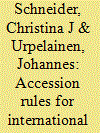

|
|
|
|
|
| Publication |
2012.
|
| Summary/Abstract |
Powerful states often accept unanimity voting on accession to international institutions, even though this enables weak states to blackmail powerful states into providing costly side payments. Whereas the literature attributes this choice mainly to efforts to bolster the legitimacy of international institutions, the authors demonstrate that the choice of unanimity also has a strategic component. The authors formally show that unanimous accession rules can profit powerful states by creating uncertainty as to the minimal level of reform that enables accession. If accession is valuable enough and the membership candidate is uncertain about the resolve of weak states, it plays safe by implementing ambitious reforms that improve the efficacy of the international institution. In this case, a legitimacy-efficacy trade-off does not exist: the unanimity rule enhances legitimacy while allowing powerful states to induce significant reforms by applicants to the benefit of current members.
|
|
|
|
|
|
|
|
|
|
|
|
|
|
|
|
| 2 |
ID:
130996
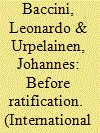

|
|
|
|
|
| Publication |
2014.
|
| Summary/Abstract |
When do international treaties cause domestic policy adjustments? While previous research emphasizes the consequences of treaty ratification, we argue that the need to secure entry into force can induce states to change their policies already before ratification. If a state expects benefits from a treaty, it can increase the probability of foreign ratification by implementing policies that benefit pivotal domestic players within its partner country. Accordingly, studies that focus on policy change after ratification underestimate the importance of treaties and partly misconstrue the causal connection between treaties and policies. We test the theory against data on the relationship between North-South preferential trading agreements (PTAs) and automobile emission standards, finding that developing countries adopt automobile emission standards between the signature and ratification of North-South PTAs.
|
|
|
|
|
|
|
|
|
|
|
|
|
|
|
|
| 3 |
ID:
175017
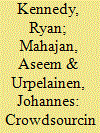

|
|
|
|
|
| Summary/Abstract |
Measuring energy access in developing countries involves much more than simply recording whether or not households are connected to the grid. Both international organizations and scholars now recognize the importance of reliable electricity supply for achieving positive development outcomes. Yet, measuring reliability is much more difficult than measuring the existence of connections. We propose an economical croudsourcing method for measuring reliability, and compare this method to energy monitor data for 122 households over 12 months. The results suggest that, while far from perfect, crowdsourcing provides a reasonably accurate method for monitoring the reliability of access over time, especially when modeled as a non-linear relationship. We apply these findings to model energy reliability in a broader group of villages across Uttar Pradesh, India, demonstrating the existence of disparities between urban and rural reliability and seasonal fluctuations in reliability. The system laid out in this study can be utilized by government and non-government organizations to quickly and cheaply monitor energy reliability.
|
|
|
|
|
|
|
|
|
|
|
|
|
|
|
|
| 4 |
ID:
110781
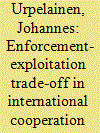

|
|
|
|
|
| Publication |
2011.
|
| Summary/Abstract |
According to the imperative of enforcement, states must threaten defectors with sanctions or reciprocal suspension of international cooperation. I show that in international cooperation between the weak and the powerful, states should nevertheless limit the supply of collective enforcement power. Strong sanctions allow exploitative international agreements, so weak states refuse to engage in negotiations with powerful states in the first place. For powerful states, toothless international agreements are a credible commitment to limit power politics. The result holds even if sanctions can be used only to enforce international agreements and not for coercion. It implies that under power asymmetry, states must accept constraints on the use of power, as opposed to simply maximizing the supply of collective enforcement power. The theory offers a new perspective to international cooperation and a synthesis of the enforcement and managerial schools of international cooperation. It produces precise analytical boundary conditions and generates falsifiable empirical hypotheses.
|
|
|
|
|
|
|
|
|
|
|
|
|
|
|
|
| 5 |
ID:
141187
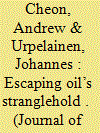

|
|
|
|
|
| Summary/Abstract |
Modern economies and militaries are fundamentally dependent on oil, but the study of energy security has fallen out of favor in the field of international relations. We develop and test a theory of when and how states invest in energy security. We argue that states implement policies to improve their energy security when they perceive a risk of a militarized dispute and international oil markets are dominated by a small number of Middle Eastern producers. Empirically, we show that industrialized countries with reasons to worry about their security have significantly increased their public investment in energy research and development in response to an increase in the Middle East’s share of the world oil supply.
|
|
|
|
|
|
|
|
|
|
|
|
|
|
|
|
| 6 |
ID:
166355
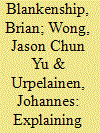

|
|
|
|
|
| Summary/Abstract |
Quality of electricity service remains poor in many developing countries. Here we examine factors that influence stated willingness to pay for better service (i.e., more hours of power per day) among rural and urban households in Uttar Pradesh, India. Besides suggesting that low willingness to pay is a major obstacle to pricing reform, we find that respondents with more social trust are willing to pay more. In a randomized survey experiment, we also find that delays in service improvements and a lack of community support for pricing reform reduce willingness to pay. These results confirm the importance of non-financial considerations in popular support for policies that impose higher prices in exchange for better service. However, we do not find evidence for sense of entitlement – the belief that government should offer basic goods and services for free – as a predictor of low willingness to pay. These results offer useful input for effective strategies to reform electricity pricing for better service and, ultimately, economic growth, particularly in areas where electricity is heavily underpriced and where governance is weak.
|
|
|
|
|
|
|
|
|
|
|
|
|
|
|
|
| 7 |
ID:
109453
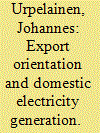

|
|
|
|
|
| Publication |
2011.
|
| Summary/Abstract |
Why are some countries developing many energy efficiency innovations, while others are lagging behind? I argue that export orientation and electricity at low variable cost from nuclear and hydropower plants have an interactive effect on energy efficiency innovation. Export-oriented countries have strong incentives to invest in energy efficiency innovation, as they are in a position to export these technology innovations for global markets. But if inexpensive electricity is supplied in a country, the domestic demand for energy efficiency innovation is missing, and so the home market cannot serve as a springboard for international commercialization. I test this theory against international patent data on energy efficiency innovation in insulation, heating, and lighting for 22 OECD countries, 1991-2007. The statistical analysis indicates that export orientation has large positive effects on energy efficiency innovation in countries that do not rely on nuclear and hydroelectricity.
|
|
|
|
|
|
|
|
|
|
|
|
|
|
|
|
| 8 |
ID:
126582
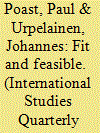

|
|
|
|
|
| Publication |
2013.
|
| Summary/Abstract |
Does democratization make states join existing international organizations (IOs)? Previous research suggests that democratization increases a state's propensity to join IOs capable of assisting in the distribution of public goods and establishing credibility for domestic reforms. We argue that this is not the case. Instead, recent democratization has a strong effect on a state's propensity to form new IOs. Since democratizing states face different governance problems than established democracies, existing IOs may not be a good "fit." Additionally, established democracies might hesitate to allow democratizing states membership in the most lucrative existing IOs, thereby making immediate accession to such IOs not "feasible." Quantitative analysis shows that democratization has a strong and consistently positive effect on the probability of forming a new IO, but not on the probability of joining an existing IO. The findings suggest that international cooperation theorists should begin to analyze forming new and joining existing IOs as alternative strategies that states can use to achieve their policy goals.
|
|
|
|
|
|
|
|
|
|
|
|
|
|
|
|
| 9 |
ID:
136611
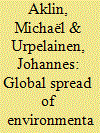

|
|
|
|
|
| Summary/Abstract |
Environmental ministries have become increasingly common, but the determinants of their global spread remain only partially understood. We develop a theory of domestic–international interactions in the global adoption of environmental ministries. We argue that domestic factors can sensitize a country to different types of international influence: foreign pressure, external support for capacity building, and learning effects. Empirically, we examine the global spread of environmental ministries, 1960–2009. We find that countries have strong incentives to establish environmental ministries when they are undergoing a democratic transition and environmental problems are salient at the international level. In other words, the democratization of a country allows international factors to promote the formation of a national environmental ministry. The findings contribute to the study of domestic–international linkages and help understand global trends in environmental governance during a period of unprecedented environmental destruction.
|
|
|
|
|
|
|
|
|
|
|
|
|
|
|
|
| 10 |
ID:
138421
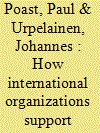

|
|
|
|
|
| Summary/Abstract |
Democratization in the developing world is, according to Samuel Huntington, “an important—perhaps the most important—global political development of the late twentieth century.” While scholars of comparative politics have explored the domestic political economy of democratic transitions, they, along with scholars of international relations, also recognize that international actors, particularly international organizations (IOs), are crucial for successful political transformation.
|
|
|
|
|
|
|
|
|
|
|
|
|
|
|
|
| 11 |
ID:
131489
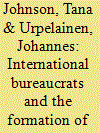

|
|
|
|
|
| Publication |
2014.
|
| Summary/Abstract |
Bureaucrats working in international intergovernmental organizations (IGOs) regularly help states design new IGOs. Sometimes international bureaucrats possess limited discretion in institutional design; sometimes, they enjoy broad discretion. In fact, they gain discretion even when they openly oppose state preferences. This contravenes conventional thinking about delegation: discretion should decrease as preference divergence between states and international bureaucrats increases. We develop a principal-agent theory of how much discretion states grant to international bureaucrats in the design of new IGOs. This is novel: while principal-agent theories of international delegation are common, scholars have not analyzed principal-agent relationships in the creation of new IGOs. We argue that even an international bureaucracy that disagrees with states' design preferences may enjoy substantial design leeway, because of states' need for bureaucratic expertise. In developing this argument, we employ a formal principal-agent model, case studies, and an original data set.
|
|
|
|
|
|
|
|
|
|
|
|
|
|
|
|
| 12 |
ID:
112887
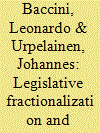

|
|
|
|
|
| Publication |
2012.
|
| Summary/Abstract |
This article shows that legislative fractionalization and leftward (but not rightward) partisan shifts increase the volatility of public R&D expenditures in new energy technologies. We develop a highly accurate estimator for public energy R&D expenditures, and examine deviations from the estimated values using data for member states of the International Energy Agency, 1981-2007. Given that unpredictable fluctuation in public spending on new energy technology reduces the positive effect of such spending on innovation, our empirical analyses imply that countries with fractionalized legislatures can improve the performance of their energy technology programs by enacting institutional mechanisms that reduce the volatility of public spending. Similarly, the results indicate that left-wing and right-wing governments can improve the performance of public technology programs through agreements that distribute gains in such a fashion that partisan shifts do not cause spending cuts. Contravening the conventional wisdom, we also find that public energy R&D is unusually stable in the United States.
|
|
|
|
|
|
|
|
|
|
|
|
|
|
|
|
| 13 |
ID:
174989
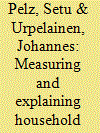

|
|
|
|
|
| Summary/Abstract |
Household electrification aims to provide populations with access to a wide range of energy services for social and economic development, ranging from lighting to electric cooking. Electrification policy has historically focused on grid connections, however, rather than household capabilities to satisfy energy service needs. We explore a representative panel dataset of households from rural areas of six states across northern India in order to link distinct dimensions of electricity supply with electrical energy service utilisation. Using a regression framework, we show that household electrification policy in India must look beyond connections and consider disaggregate dimensions of supply, paying special attention to supply availability measured in hours per day. Following electrification, households surveyed were highly likely to utilise lighting and ICTs regardless of availability, while an improvement of 12 h was associated with higher likelihoods of space cooling (12.3%-points [CI: 10.7 to 13.9]) and entertainment (13.4%-points [11.2 to 15.6]) services utilisation. In contrast, mechanical loads, thermal loads, refrigeration and electric cooking remain constrained by household wealth and other factors. Disaggregate supply analysis supports the shift towards electrification policy that unlocks desired capabilities while using all available technologies, both grid and off-grid, to achieve more just outcomes for all.
|
|
|
|
|
|
|
|
|
|
|
|
|
|
|
|
| 14 |
ID:
122304
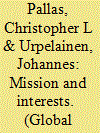

|
|
|
|
|
| Publication |
2013.
|
| Summary/Abstract |
International advocacy campaigns allow the concerns of disadvantaged groups in developing countries to reach policymakers. However, recent research has challenged the motivations of the Northern nongovernmental organizations involved and raised concerns about the impacts of North-South NGO partnerships on Southern NGO control. This article addresses these concerns by developing a typology of NGOs based on their financial incentives and the rigidity with which they adhere to their established organizational mission. It then models interactions between NGOs of different types as a strategic game. In the game, NGOs decide whether to enter international campaigns and, if so, manage campaign function to maximize payoff. "Participation-oriented" Northern NGOs, whose supporters reward them for undertaking advocacy, were found to run lengthy but ineffective campaigns and focus on publicity. "Outcome-oriented" groups, whose supporters reward them for measurable achievement, were found to generate higher campaign intensity but exit after either early victories or costly difficulties. The model is illustrated with a comparative analysis of two different campaigns regarding the Narmada Dam project.
|
|
|
|
|
|
|
|
|
|
|
|
|
|
|
|
| 15 |
ID:
171400
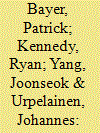

|
|
|
|
|
| Summary/Abstract |
Universal household electrification is a key component of the United Nations Sustainable Development Goals, but the evidence base for social and economic impacts of electricity access remains unclear. Here we report results from a systematic review of impact evaluations of household electrification based on five key outcome measures. We only find 31 studies that conduct statistical hypothesis tests to assess impacts. Among these, seven draw on a randomized experiment designed for causal inference. The randomized experimental studies generate fewer positive results than observational or quasi-experimental studies, such as correlational, instrumental variable, and difference-in-differences designs. These results call for a reassessment of what we know about the impacts of household electrification. They also call for major investment in impact evaluation of electricity access using randomized controlled trials, with a particular focus on when and how energy access interventions can furnish large benefits to their intended beneficiaries. Large-scale impact evaluations using experimental methods will require close collaboration between policymakers and researchers.
|
|
|
|
|
|
|
|
|
|
|
|
|
|
|
|
| 16 |
ID:
128969
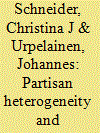

|
|
|
|
|
| Publication |
2014.
|
| Summary/Abstract |
This article analyzes the relationship between partisan heterogeneity and cooperation in international organizations. We argue that partisan heterogeneity increases distributional conflict among states during intergovernmental negotiations, thereby increasing the costs of cooperation. This decreases governments' willingness to contribute to cooperative efforts. We test the theory against data on governments' financial contributions to the European Development Fund. The empirical analyses robustly demonstrate that partisan heterogeneity reduces governments' incentives to contribute to European cooperation on international development. On a more general level, we offer new perspective on the role of domestic politics in international cooperation.
|
|
|
|
|
|
|
|
|
|
|
|
|
|
|
|
| 17 |
ID:
141190
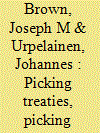

|
|
|
|
|
| Summary/Abstract |
International treaty negotiations and domestic politics are interrelated. We show that negotiators can strategically select treaties to mobilize domestic interest groups and support particular candidates for office. Interest groups will support (oppose) political parties that will ratify treaties benefiting (harming) them. By designing treaties that mobilize these “swing” groups, negotiators can affect different parties’ chances of assuming power. Our model produces specific predictions for treaty design, contingent on the preferences of negotiators, parties, and interest groups. With conservative and moderate interest groups, the results may be counterintuitive—for instance, foreign governments pushing liberal treaties on liberal incumbents they dislike, intentionally mobilizing interest groups against the treaty and in favor of conservative challengers. Highly competitive systems, particularly those where moderate interest groups’ support is in play, give treaty negotiators leeway to shape political outcomes. Powerful interest groups may exert strong influence or no influence, depending on the cost of appeasing them and whether domestic and foreign negotiators are willing to gamble the incumbent’s political future for the achievement of their policy ideals.
|
|
|
|
|
|
|
|
|
|
|
|
|
|
|
|
| 18 |
ID:
101620
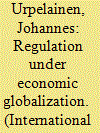

|
|
|
|
|
| Publication |
2010.
|
| Summary/Abstract |
How does economic globalization shape the regulations that states enact to control negative externalities? Previous research downplays the role of international cooperation and the present historical context, so it cannot offer a coherent theoretic account of the empirical record. I construct a formal model in which states can engage in regulatory cooperation to coordinate their policies. I prove three main results. First, a "race to the bottom" is unlikely because it requires non-cooperative adjustments by industrialized countries. Second, a partial "race to the top" is likely because many emerging countries stand to gain from reduced negative externalities and the competitiveness problem is limited when the most lucrative export markets are already regulated. Finally, powerful industrialized countries with a high regulatory capacity benefit from a global expansion of regulation.
|
|
|
|
|
|
|
|
|
|
|
|
|
|
|
|
| 19 |
ID:
115314
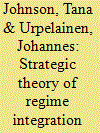

|
|
|
| 20 |
ID:
113952
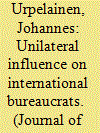

|
|
|
|
|
| Publication |
2012.
|
| Summary/Abstract |
The conventional wisdom emphasizes agency slack or bias as the central problem of international delegation. I show that the possibility of a unilateral influence contest is equally problematic. States can exert unilateral influence on autonomous international bureaucrats, either through rewards or through punishments, to pursue their particular interests. A costly contest results, so some states could refuse to delegate because they expect others to be too influential. The analysis has four counterintuitive empirical implications. First, international agreements often favor institutionally weak states that are disadvantaged in the unilateral influence contest. Second, states could limit the autonomy of an international organization even if this prompts bad policies. Third, a state can sometimes profitably exchange distributional concessions for autonomy. Finally, constraints on unilateral influence are possible only if a disadvantaged state can credibly commit to compensating an advantaged state for it. A central broader contribution of the analysis is to show how power politics influences the rational design of international institutions.
|
|
|
|
|
|
|
|
|
|
|
|
|
|
|
|
|
|
|
|
|